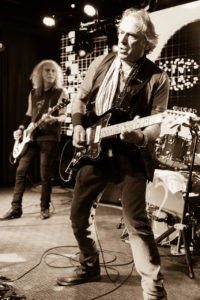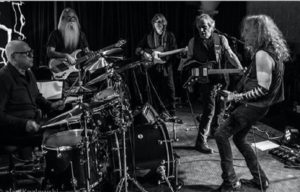
Danny Kortchmar (at right) with The Immediate Family. Photo by Alan Kozlowski.
People in the know are aware that many of the hits of the ‘60s,’70s, and ‘80s were crafted by “shadow virtuosos”—musicians who toiled almost anonymously in recording studios, taking embryonic songs that often had little more than a chord chart, and transforming them into the joyous, riff-heavy, multi-layered productions that blasted out of car radios and turntables. Happily, films such as The Wrecking Crew (2008), 20 Feet From Stardom (2013), and Hired Gun (2016) have snatched a bit of the spotlight from the stars, and directed its beam at the supporting players who were essential ingredients of so much transcendent music.
Guitarist Danny Kortchmar is a crucial and indispensable member of that small band of legendary session musicians. Well, he’s actually somewhat of a hybrid, as his “other gigs” as a songwriter, producer, and solo artist have earned him his very own spotlight from time to time. However, Kortchmar first gained renown as one of the studio wizards supporting the singer/songwriter era, playing on hit albums by James Taylor, Carole King, Linda Ronstadt, Jackson Browne, Carly Simon, and others. In fact, the session group he formed in the 1970s with bassist Leland Sklar, drummer Russ Kunkel, and keyboardist Craig Doerge was so omnipresent on the charts that the team was given the, ahem, less-than-gracious tag of “Mellow Mafia.” It wasn’t exactly the ideal term for musicians with big ears and perceptive chops who were always striving to, as Kortchmar once said, “help the song, play simple parts, and don’t step on the singer.”
That sensitivity certainly helped Kortchmar’s success as a songwriter and producer, and he had a tremendous impact on music culture as a co-writer and co-producer with Don Henley on the Eagles co-founder’s smash solo albums I Can’t Stand Still (1982), Building the Perfect Beast (1984), and The End of the Innocence (1989). Not one to rest on his mountain of laurels, Kortchmar still rocks out as a member of The Immediate Family with Section co-conspirators Sklar and Kunkel, as well as guitarist Waddy Wachtel and guitarist/vocalist Steve Postell.
Kortchmar obviously has a deep well of musical knowledge, he is a part of musical history, and he possesses an encyclopedia of rock and roll stories—all of which he will share at an exclusive event full of music and conversation at the Grammy Museum’s Clive Davis Theater on Thursday, February 28. The evening will be hosted by Grammy Museum Artistic Director Scott Goldman. Doors open at 7 pm, and the show kicks off at 7:30 pm. Tickets are $25.
On the eve of the big event, Kortchmar kindly offered an exclusive preview to Guardians of Guitar. Of course, we only touch on a few “guitar player-ly” subjects here, so get yourself down to the Grammy Museum on Thursday to hear loads more fabulous stories from a musician who etched himself into rock and roll history.

In 2018, The Section was inducted into the TEC Hall of Fame (Kortchmar is at far right, and 2018 Les Paul Innovation Award winner Jackson Browne is second from left).
What is one of the main musical challenges you’ve faced when trying to give an artist or producer what they want for a track?
A lot of times, people don’t express themselves very well. They’ll say, “I want a Hendrix part.” And I’ll go, “Well, Hendrix covered a wide area. Which Hendrix?” Usually, I’ll just try a few things until I get a reaction. You know, “Hit the Record button and let’s see what happens.”
The ability of great studio musicians to find brilliant parts almost immediately is almost like voodoo. When you hear a song for the first time, are there any creative gymnastics that your brain goes through?
Well, for studio musicians who play on pop records, coming up with parts right away is a huge component of their skill set. How we do that is hard to codify, but, basically, you have to draw on everything you know. You should absorb everything you hear, because you never know when you’ll be able to use bits and pieces of those things. Also, what helped me a lot is that I’m a songwriter. I have to think of parts for my own songs, and that helps me when I’m playing on someone else’s tune.
So there’s no specific methodology to a typical session?
I don’t have a protocol for coming up with parts. Stuff just comes to me. Instinct takes over. I might fool around for a while, as I look for something that will fit in the pocket, make the band breath, and help the singer. Generally, I hear two or three different approaches when I first hear something, and I have to decide what to hit first. Usually, that’s a simple rhythm part to help the drummer and keep the thing going. You should always start with something really simple.
You mentioned that being a songwriter helps you come up with parts. Specifically, how does that skill work for you?
Overall, being a songwriter helps you understand the DNA of a song, as well as how a song is created. When I’m doing a session, I often ask, “What would I want for my song?” I wouldn’t want a lot of busy stuff. I’d want simple, expressive parts that helped the song.
Do you think that some guitarists can bobble their support role if they focus on solos, riffs, and unique tones?
I don’t know to what degree this is taught in music schools anymore, but if you can’t play songs, it tremendously limits your ability to get gigs. Most of the time you’ll spend as a guitar player will be accompanying someone else, as opposed to playing solos. The ability to play solos—even great solos—is not the part that’s going to have people want you around. It’s more about coming up with something that helps the other musicians, energizes the song, and clarifies the general picture, rather than thinking about yourself. You need to listen to what everyone else is doing.
Obviously, that critical listening should happen whether you’re tracking live with a band, or creating songs piece by piece on a laptop.
Doing things one track at a time is not my favorite way to do things. I’d rather be in there with all the cats—you know, five guys all playing simultaneously. There’s nothing like playing with a live band.
Can you specify one of the things you love when everyone plays together?
What happens with everyone plays together is that there is almost another band member in there, because the collective sound has its own feel and vibe. There’s also the aspect of leakage that happens between everyone that adds to the sound of a record—and that’s actually a lot of what people like when they refer to “analog sound.” It’s not just about tape—it’s the sonic quality that happens when people play together.
What is your current gear setup?
I play a G&L Doheny, which is very playable and extremely adaptable to the various playing situations I find myself in. My amp is a Roland Blues Cube Artist 212, and it’s a fantastic amplifier. I’m not really an effects guy, so I use a small Line 6 multi-effects box for tremolo and delay on a couple of tunes, and maybe an overdrive once in a while. When I want to play a solo, I just turn the Doheny’s volume knob up. I never liked the idea of stomping on a pedal for every solo. I like something that flows between whatever you’re doing behind the song and going into your solo. There should be a flow, rather than hitting a pedal, and—BANG—the solo! I should mention that the gear I started on was a Telecaster through a Princeton amp—which to me is one of the greatest non-master-volume amp designs ever. If you can’t do it on a Princeton, you’re in trouble.

The Immediate Family
It’s so awesome that you still dig playing in bands. Given all the sessions and live performances under your belt, what’s special about being in The Immediate Family?
These guys have been my brothers for many years, and we have a great time. We just hit it, and generally we come up with the right stuff very quickly—even with three guitars. I’m always interested in hearing what Waddy and Steve are going to do. There’s not a lot of conversation that goes on. They just come up with great parts.






Great interview!